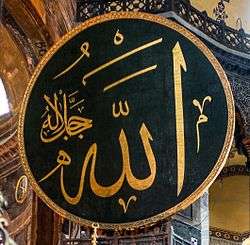Alhamdulillah
| Part of a series on |
| God in Islam |
|---|
 |
|
Al-ḥamdu lillāh (Arabic: الحَمْد لله) or alḥamdulillāh is an Arabic phrase meaning "Praise be to God". It is frequently used by Muslims of every background, due to its centrality to the texts of the Quran and the words of the Islamic prophet Muhammad, but also spoken by some Arabic-speaking Christians and Jews.
The meaning and in-depth explanation of the phrase have been the subject of much exegesis.
Meaning
The phrase has three basic parts:
- Al - The definite article, "the".
- Ḥamdu - Meaning "praise", "commendation".[1]
- Li-l-lāh - preposition + noun Allah. Li- is a preposition meaning "for," "belonging to," etc.
The word "Allah" is itself the fusion of the definite article al (the) and the word ilah (a god, deity). Like in English, the article is used here to single out the noun as being the only one of its kind, "the god" (the one and only) or "God" with a capital G (the concept of capital letters does not exist in Arabic). Therefore, "Allah" is the Arabic word for "God". "ilāh" is the Arabic cognate of the ancient Semitic name for God, El.
The phrase is first found in the second verse of the first sura of the Qur'an (Al-Fatiha). So frequently do Muslims and Arabic-speaking Jews and Christians invoke this phrase that the quadriliteral verb hamdala (حمدل), "to say al-Hamdu li-'llah" was coined, and the derived noun hamdalah (حمدلة) is used as a name for this phrase.[1]
On any occasion and in any situation when Muslims desire to praise God, they may say: Alhamdulillah (الحمد لله).
The triconsonantal root Ḥ-M-D (ح م د), meaning "praise," can also be found in the names Muhammad, Mahmud, Hamid and Ahmad.
Translation
| Alhamdulillah | |
| Arabic | الحمد لله |
|---|---|
| Romanization | Al-Ḥamdulillāh, Alḥamdulillāh |
| Literal meaning | Praise to God |
English translations of "Alhamdulillah" include:
- "All praise is due to God alone" (Muhammad Asad)
- "All the praises and thanks be to Allah" (Muhammad Muhsin Khan)
- "Praise be to Allah" (Abdullah Yusuf Ali, Marmaduke Pickthall)
- "All praise is due to Allah" (Saheeh International)
Use in other historical sources
Jabir ibn Abd-Allah wrote in a hadith that Muhammad, said: "The best remembrance of God is to repeat La ilaha ilallah and the best prayer (du'a) is Alhamdulillah (all praise belongs to God)." (Narrated by Nasa'i, Ibn Majah, and Hakim who declared its chain 'sound'.)
Abu Huraira wrote that Muhammad said: "Any matter of importance which is not begun with Alhumdulillah remains defective." From Abu Dawood
Anas bin Malik wrote that Muhammad said: "God is pleased with his slave who says, 'Alhumdulillah' when he takes a morsel of food and drinks a draught of water."
See also
- Al-hamdu lillahi rabbil 'alamin
- Dhikr
- Ash Shakur
- Glossary of Islam
- Hadha min fadli Rabbi
- Hosanna
- Subhan Allah
References
External links
- AlHamdulillah - Detailed Explanation from Tafseer Ibn Katheer - Surah Fatiha
- Health benefits of saying Alhamdulillah
- Everyday duas in Arabic with transliteration and translation
- Alhamdulillah-Commentary
- alhamdulillah in arabic